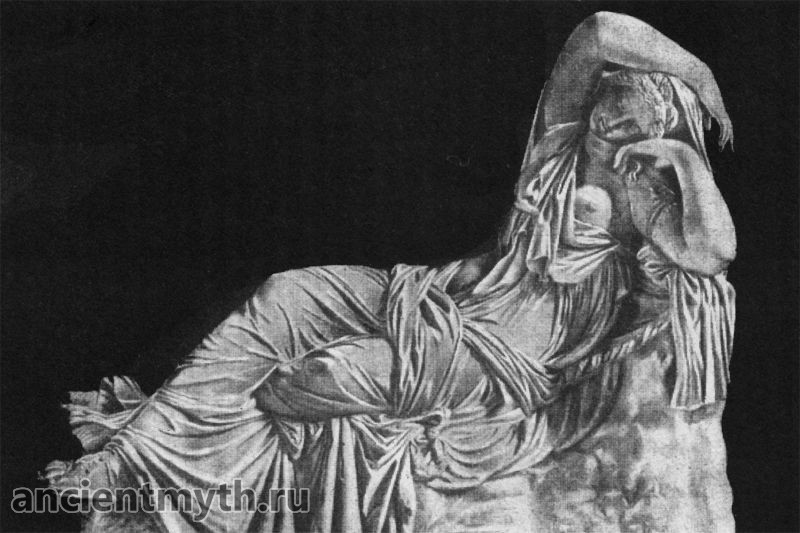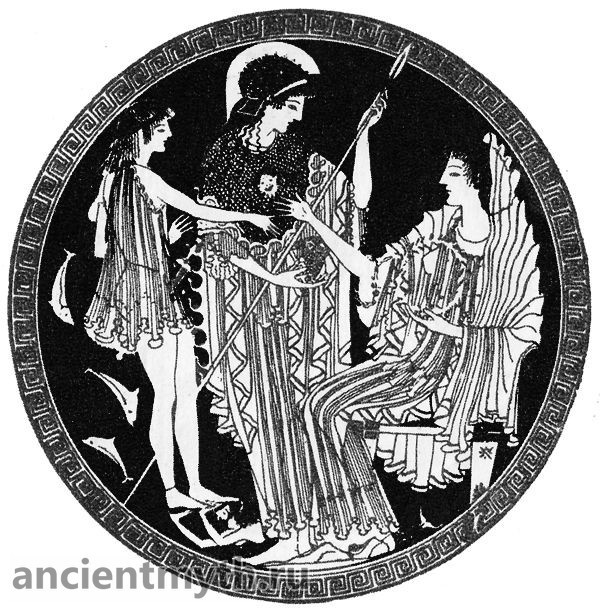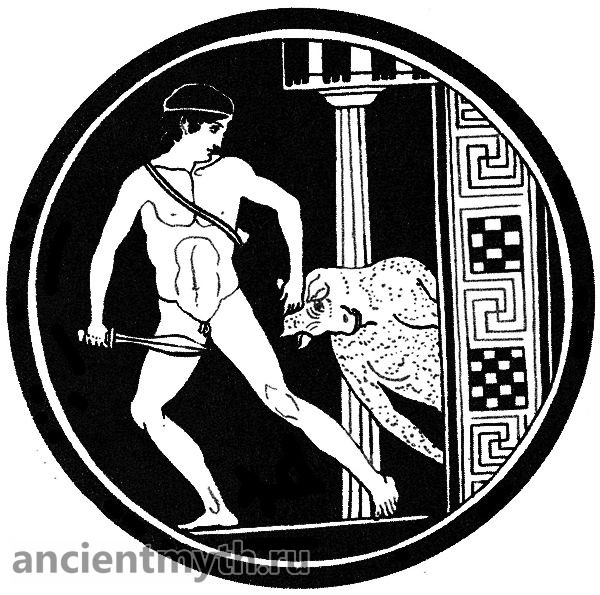Theseus' Journey to Crete
When Theseus came to Athens, the whole of Attica was immersed in deep sadness. For the third time, ambassadors from Crete arrived from the powerful king Minos for tribute. This tribute was heavy and shameful. The Athenians had to send seven boys and seven girls to Crete every nine years. There they were locked up in a huge Labyrinth palace, and they were devoured by a terrible monster Minotaur, with the torso of a man and the head of a bull. Minos imposed this tribute on the Athenians for killing his son Androgea. Now for the third time the Athenians had to send a terrible tribute to Crete. They have already equipped a ship with black sails as a sign of mourning for the young victims of the Minotaur.

(Statue of IV century BC)
The ship arrived happily to the island of Crete. The Athenian boys and girls were taken to Minos. The mighty king of Crete immediately drew attention to the beautiful young hero. The king's daughter also noticed him, Ariadne, and the patroness of Theseus, Aphrodite, aroused in Ariadne's heart a strong love for the young son of Aegeus. The daughter of Minos decided to help Theseus; she could not even imagine that the young hero would die in the Labyrinth, torn apart by the Minotaur.
Before going to battle with the Minotaur, Theseus had to perform another feat. Minos insulted one of the Athenian girls. Theseus stood up for her, but, proud of his origin, the king of Crete began to mock Theseus; he was angry that some Athenian dared to oppose him, the son of Zeus. Theseus proudly replied to the king:

(Drawing on a vase.)
- You are proud of your descent from Zeus, but I am not the son of a mere mortal, my father is the great earth shaker, the god of the sea Poseidon.
- If you are the son of the god Poseidon, then prove it and get a ring from the depths of the sea, - Minos answered Theseus and threw a golden ring into the sea.
Calling his father Poseidon, Theseus fearlessly rushed from the steep shore into the waves of the sea. The salt spray flew high, and the waves of the Theseus Sea hid it. Everyone looked with fear at the sea that swallowed the hero, and were sure that he would not come back. Full of despair, Ariadne stood; and she was sure that Theseus was dead.
And Theseus, as soon as the sea waves closed over his head, was picked up by the god Triton and in the blink of an eye drove to the underwater palace of Poseidon. Poseidon gladly welcomed his son in his magical underwater palace and gave him the ring of Minos, and Poseidon's wife, Amphitrite, delighted with the beauty and courage of the hero, laid a golden wreath on Theseus' lush curls. Triton again picked up Theseus and carried him out of the depths of the sea to the shore at the place from which the hero threw himself into the sea. Theseus proved to Minos that he was the son of Poseidon, the lord of the sea. Minos' daughter Ariadne rejoiced that Theseus had returned unharmed from the depths of the sea.

(Drawing on a vase.)
Now it was necessary to take care of saving from the wrath of Minos. Theseus quickly equipped his ship and, having cut through the bottom of all the Cretan ships pulled ashore, quickly set off on his way back to Athens. Ariadne followed Theseus, whom she fell in love with.
On the way back, Theseus went to the shore of Naxos. When Theseus and his companions were resting from their journey, the god of wine Dionysus appeared to Theseus in a dream and told him that he had to leave Ariadne on the deserted shore of Naxos, since the gods had appointed her to marry him, the god Dionysus. Theseus woke up and, full of sadness, quickly set off. He dared not disobey the will of the gods. Ariadne, the wife of the great Dionysus, became the goddess. The companions of Dionysus greeted Ariadne loudly and praised the wife of the great god with singing.
And Theseus' ship was rushing fast on its black sails across the azure sea. The coast of Attica has already appeared in the distance. Theseus, saddened by the loss of Ariadne, forgot the promise given to Aegeus - to replace the black sails with white ones if he, having defeated the Minotaur, returns happily to Athens. Aegeus was waiting for his son. Staring into the distance of the sea, he stood on a high rock near the seashore. Here a black dot appeared in the distance, it grows, approaching the shore. This is his son's ship. He's getting closer. Egey looks, straining his eyes, - what sails are on it. No, the white sails do not shine in the sun, the sails are black. So Theseus died. In despair, Aegeus threw himself from a high cliff into the sea and died in the waves; only his lifeless body was thrown ashore by the waves. Since then, the sea in which the Aegean died has been called the Aegean. And Theseus landed on the shores of Attica and was already offering thanksgiving sacrifices to the gods, when suddenly, to his horror, he learned that he had become the involuntary cause of his father's death. The grief-stricken Theseus buried his father's body with great honors, and after the funeral he assumed power over Athens.